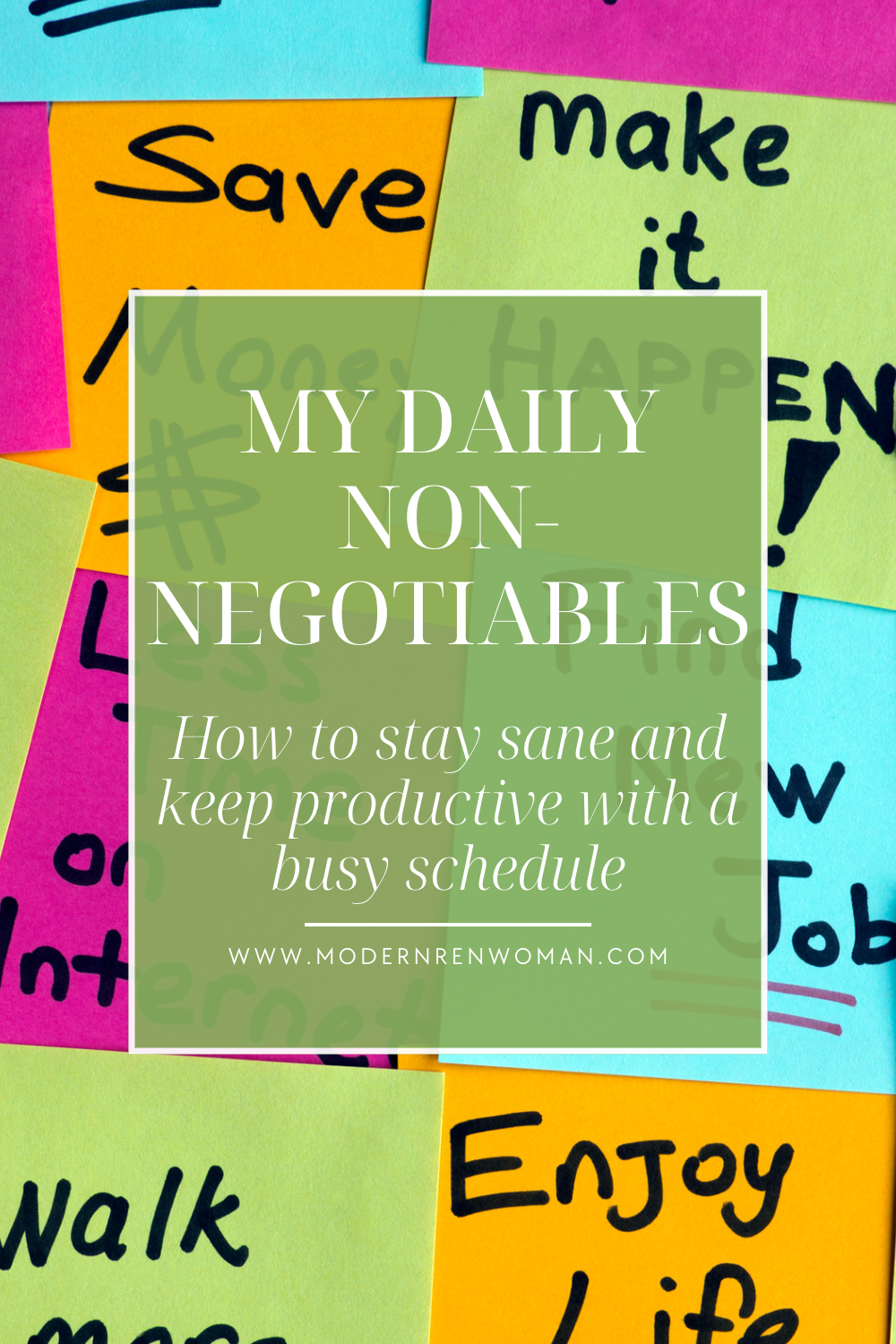My Daily Non-Negotiables

Over the past month, I've been juggling two jobs, working 70 hours a week, commuting for another ten, dealing with a sick dog, and managing my regular life stuff. It's been a busy time. When I was a part time student, I had a complex system of apps and a rigid schedule which helped me keep my life on track. With the new job and the new schedule, that system has fallen apart.
My question became: how can I keep my life together when I'm working 13 hours a day and my schedule is packed and unpredictable? It was one thing to schedule an hour of writing after coming home at 9 PM, but it was much harder to follow through when I was too exhausted to form coherent sentences, let alone write. For my own sanity, I had to put aside my expectations of perfect time-blocking and perfectly balanced to-do lists. I had to focus on survival until my life smoothed back out and I could reintroduce my carefully-crafted systems.
This is where I started creating my list of non-negotiables. These were habits that I considered essential for my health and well-being. It's something that I commit to doing every day, no matter what. Non-negotiables are not about perfection or achieving a certain standard of productivity. They're simply a tool for prioritizing self-care and ensuring that you're taking care of yourself, even when life gets busy.
I sat down and looked at my daily to-do list. As an ambitious person with big dreams, it was a lot. Meditate. Do 15 minutes of language learning. Strength training. Do the NYT crossword puzzle. Work on digital products for TPT. These are all things which are nice to do, as they could make me smarter, stronger, and a better person. But this was about survival. I looked at my list and asked myself whether each item was something I could take a month or two off from, or if it was something which was necessary for my health and sanity. I eventually limited myself to these five:
1. Go to bed before eleven
I'm an early riser, and even on mornings when I give myself permission to sleep in, I usually find myself awake by 7 AM. Usually, I don’t have a problem going to sleep before eleven as my natural body clock wants me to go to bed on the earlier side. However, with my current schedule there are some nights when I’m not even getting home until 9 PM. This has led me to engage in some revenge sleep procrastination, where I stay up later trying to make up for time at home that work has taken from me. A few days ago, I caught myself vacuuming the floor at one in the morning. I like a clean house, but the floors were not worth the blow to my mood and health. Sleep affects your entire body. Even if you exercise and eat right, your body will start breaking down if you don't get enough sleep. Your cognitive functions take a huge hit, especially in your mood, memory, and creativity. Your body does not operate at peak efficiency, and chronic lack of sleep can even lead to heart problems. Most adults need seven hours of sleep, and since I usually wake up at six, going to bed by eleven ensures that I'm at least getting the minimum I need to get by. I use Sleep Cycle to track my sleep, but Apple has a resident sleep app which also works pretty well if you like to keep track of your hours.
2. Drink 70 oz water
Your body needs water for pretty much everything. Your circulation, cognitive functions, energy level, gut health, and more all depend on your water intake. Drinking water isn't just a nice thing to do to stay healthy; it's something your body needs to stay alive. Plus, if I don't drink enough water, I get a massive headache. I like using Waterllama to track my water intake, as it will automatically adjust hydration based on the type of drink. It also automatically adjusts your recommended water intake based on your gender, weight, activity level, and climate. Drinking enough water can help boost your energy levels, and even improve your mood. If you want to set yourself up for success on busy days, you have to fuel your body right, and that starts with water.
3. Journal for ten minutes
Especially in times of chaos and upheaval, I count on my journal to organize my thoughts and sort out the craziness of the day. Journaling is scientifically proven to help with your mood and memory, among other less obvious benefits like improved immune system and higher I.Q. The list of successful people who keep a journal is much longer than you would expect. Not just people from history such as Marcus Aurelius, Leonardo da Vinci, Albert Einstein, and Marie Currie, but also modern celebrities such as Warren Buffet, Oprah Winfrey, and Jennifer Aniston. When I first started journalling, I felt more in control of my emotions, took better control of my day, and felt better about life. I will eventually write a longer post on journalling, but I use a combination of physical journals and the DayOne journal app to stay on top of my journalling habit.
4. Read one chapter of a book
Along with journalling, reading is one of the most important things you can do to manage your emotional, intellectual, and mental health. Reading reduces stress, helps you get in touch with your emotions, and builds up your brain. There is even research showing that readers live longer than nonreaders. The best part is, you don’t need to read stuffy nonfiction to receive these benefits. Lovers of trashy romance novels and violent mangas are more than welcome here. I usually have at least two books going at a time, and one of those books is always an audiobook. That way, even on days I’m especially tired or busy, I can easily listen to a chapter of my audiobook. I have been using Audible for years and love it, but I would be remiss in my duties as a librarian if I didn’t encourage you to check out your local library’s audiobook offerings. Many public libraries have subscriptions to Libby or Overdrive which provide free loans to ebooks and audiobooks.
5. Go for a walk
In an ideal world, I would have time to exercise every day. Healthy bodies need exercise, and one of my long term goals is to achieve 150 minutes of moderate to vigorous exercise a week. This is good for your heart, good for your mind, and is key to a long and healthy life. However, some weeks it just feels impossible to get even one workout in. When I'm having one of these weeks, I always fall back on walking. While a well-rounded exercise routine should incorporate some strength and cardio, a daily walking routine still provides a ton of health benefits with a much lower barrier to entry. Walking improves your mood, is great for your heart health, and helps with your sleep and immune system. I don't stress about reaching the arbitrary 10,000 steps a day, but on days I at least go around the block with my dog, I feel much more energized and have a much better day.
Making your own non-negotiable list
I recommend sitting down, looking at your own daily to-do list, and writing out the five things that you truly cannot live without. While I firmly believe that sufficient sleep and water should be on everyone's list, the rest of your list will probably look a little different than mine. For example, I know a lot of people who have meditation on their non-negotiable list (it’s not on mine since my daily walk can double as meditation / mindfulness time). Once you come up with your list, then place them in order of importance. That way, if you are truly pressed for time and you need to skip something, you skip the least important stuff first. For example, when I'm having a particularly difficult day, I will skip going for a walk before I skip reading or journalling.
When making your list, try to only include habits which you already have been developing for a while. Your non-negotiables are not a place to test out a new health fad or productivity system; this is your fall-back survival list for particularly difficult days. Make your non-negotiables an obvious and easy integration to your daily life. Set a filled water bottle near your TV so you remember to drink when you turn on your favorite show. Set an alarm reminding you when bedtime is imminent. Download a journaling app which gives prompts if you need to offload some of the mental load of deciding what you want to write about.
In today's fast-paced world, it can be easy to forget to take care of ourselves. With the constant demands of work, family, and social obligations, self-care often falls by the wayside. However, neglecting our own well-being can lead to burnout, stress, and a host of other physical and mental health problems. This is where creating a list of non-negotiables can be a game-changer. Above all, non-negotiables are about taking care of yourself. They're a reminder that your health and well-being are important, and that you deserve to prioritize them. By committing to your non-negotiables every day, you'll be taking an important step towards a healthier, happier, and more balanced life.
Thank you for taking the time to read this post! As we strive to cultivate our creativity and intellectual curiosity, let’s continue to push ourselves and others to be lifelong learners. If you enjoyed this post and want to stay up-to-date on future articles, please consider subscribing to our newsletter for regular updates and insights. You'll gain access to exclusive updates, behind-the-scenes content, and more. Not to mention, you'll be the first to hear about any exciting news or developments we have in store. Sign up today and become a part of our growing community!


